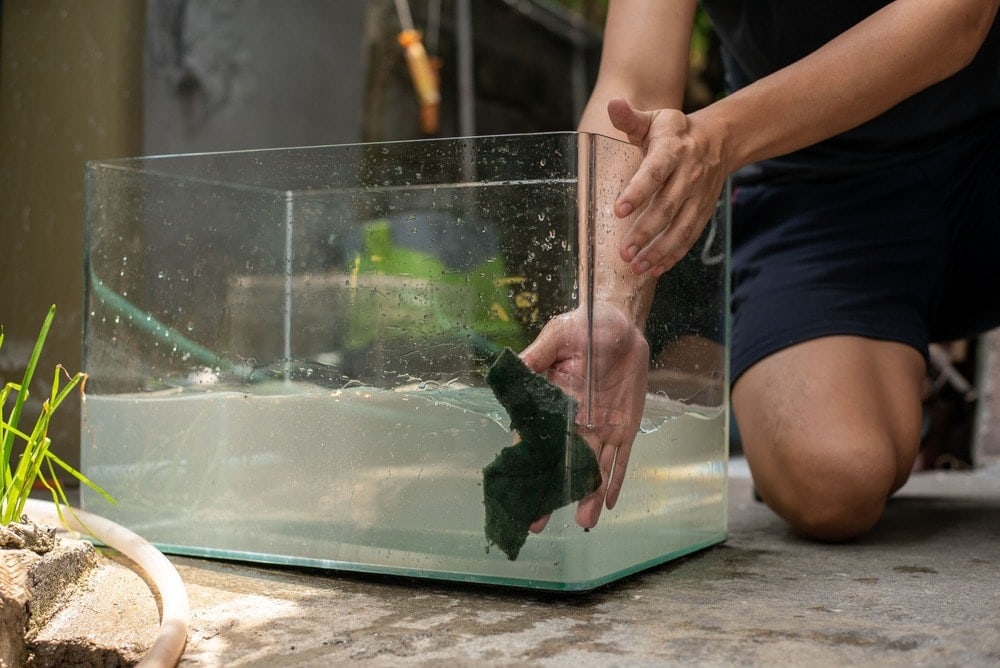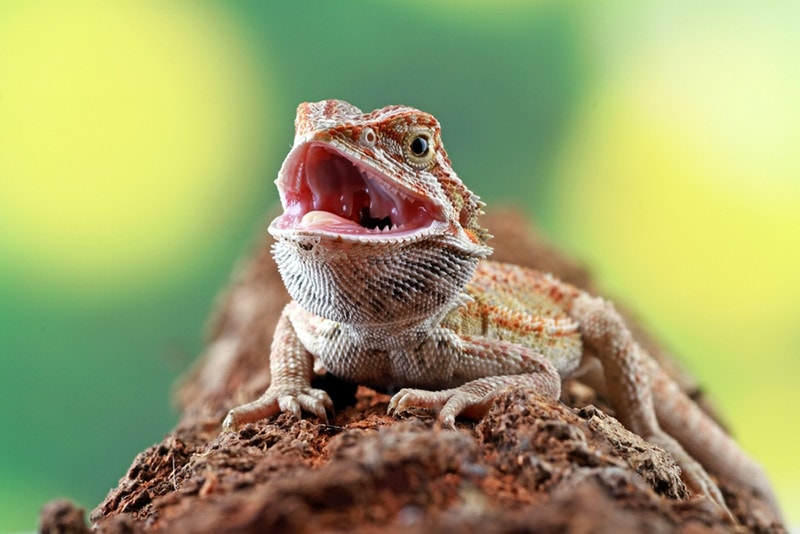Can Bearded Dragons Eat Meat? Vet-Reviewed Nutrition Facts
Updated on
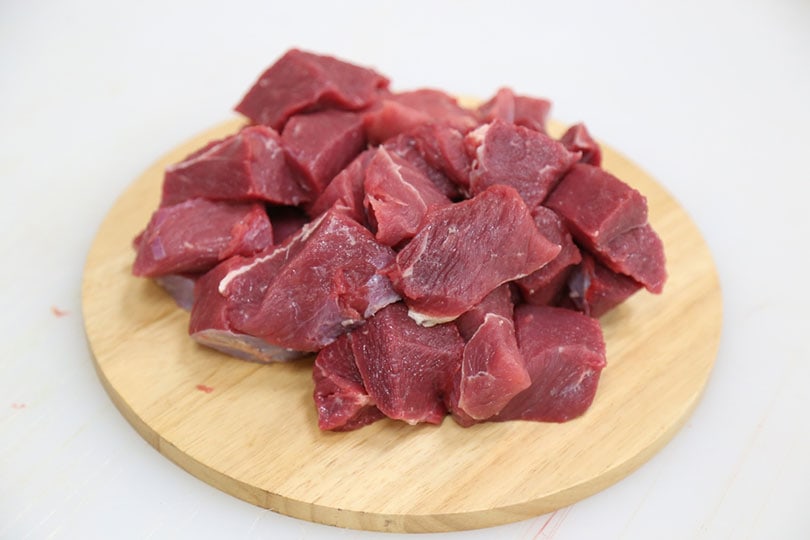
Bearded dragons, as with most lizards, are omnivorous. When they reach adulthood, they err on the herbivorous side more. Most of the carnivorous portion of a beardie’s diet will consist of invertebrates (insects), though some owners offer other protein sources occasionally. You might wonder if you can share your home-cooked meat with your beardie.
While meats like chicken, beef, and pork are unlikely to cause lasting damage if offered in very small quantities very occasionally, it’s generally not recommended to provide such meats to your bearded dragon. Read on to learn more.
Can Bearded Dragons Eat Meat?
While wild bearded dragons will eat meat, they have a very different lifestyle than the captive reptiles we keep in enclosures in our homes. A beardie in its natural habitat will eat much the same diet as your pet would, with the addition of any small vertebrate that it can catch (such as rodents or lizards).
However, your dragon isn’t as physically active as his wild counterparts, so his nutritional needs aren’t exactly the same. Additionally, you’re likely not chowing down on mice or reptiles at the dinner table, so you’re probably wondering whether your pet can eat your home-cooked protein sources.
Meat is generally not considered toxic for bearded dragons, but just because it won’t cause immediate harm to your pet doesn’t mean you should feed it to him. Many types of meat we prepare for ourselves are high in phosphorus, which is good for us but not for our dragons.
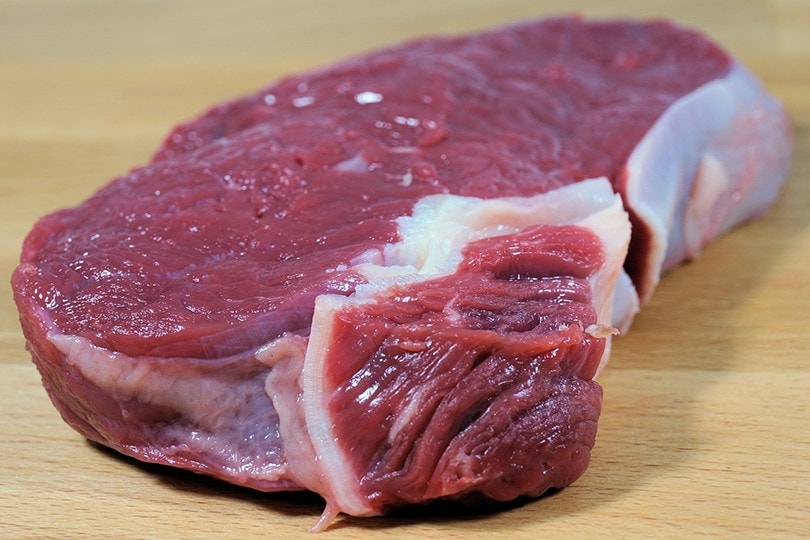
What’s the Deal With Bearded Dragons and Phosphorus?
Reptile keepers need to provide the right calcium-to-phosphorus ratio when feeding their pets. The perfect ratio should be greater than 2:1 (Ca:P). Beardies fed a diet too high in phosphorus and too low in calcium may be at risk of developing metabolic bone disease (MBD) as the phosphorus in their diet blocks calcium absorption. This painful condition causes softening of the facial bones and hind limb swelling. Beardies with MBD may tremor when they try to walk and may be too weak even to stand.
Can Beardies Eat Chicken?
While a small amount of chicken is unlikely to cause lasting harm, it’s not something your dragon needs in his diet. The Ca:P ratio for cooked chicken is around 1:15.2, which is far too high to be safe as a regular snack for your beardie.
Can Beardies Eat Lean Ground Beef?
As with chicken, the Ca:P ratio for lean ground beef shows it is far too high in phosphorus to be safely fed as anything more than the occasional treat. The ratio is approximately 1:22. Additionally, even though it is lean, it still has more fat than necessary for a bearded dragon’s diet.

Can Beardies Eat Pork?
Pork is also way too high in phosphorus for your beardie. The Ca:P ratio is roughly 1:44.5. Some cuts of pork can be high in sodium and fats, neither of which your beardie requires in his diet. Pork should always be avoided for your beardie.
What About Fish?
While fish may look like a better meat-based option if we’re basing the appropriateness solely on the calcium-to-phosphorus ratio, there are other reasons you should avoid offering it to your pet.
Aside from fish not being a part of a dragon’s natural diet, fish can contain parasites and bacteria that can make your pet very ill.
Even offering feeder fish—those born and raised specifically for use as live food for captive animals like turtles or carnivorous aquarium fish—could be bad for your beardie. As well as the risk with bones, common feeder fish like goldfish and rosy red minnows contain thiaminase, an enzyme that blocks the absorption of thiamine. Thiamine is necessary for the development and function of nervous tissues.
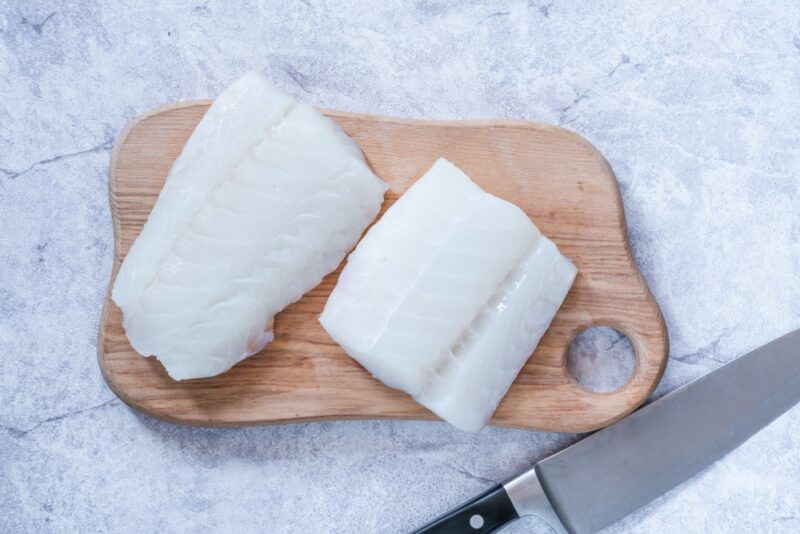
What Is the Perfect Diet for a Bearded Dragon?
The primary component of a bearded dragon’s diet should be vegetables. A variety of veggies is ideal as it will ensure no nutritional deficiencies in your pet’s diet.
The best staples to add to your beardie’s daily salad include:
- Arugula
- Bok choy
- Cactus pads
- Collard greens
- Mustard greens
- Pea shoots
- Spring mix
- Turnip greens
To add variety to the salad, mix in veggies and herbs like:
- Basil
- Bell peppers
- Cilantro
- Carrot greens
- Carrots
- Lemon balm
- Mint leaves
- Swiss chard
- Zucchini
In addition to veggies, your beardie needs protein from gut-loaded bugs. The best feeder insects include:
- Black soldier fly larvae
- Crickets
- Dubia roaches
- Hornworms
- Silkworms
You can use the following protein sources as very occasional treats:
- Superworms
- Butterworms
- Waxworms
- Pinky mice
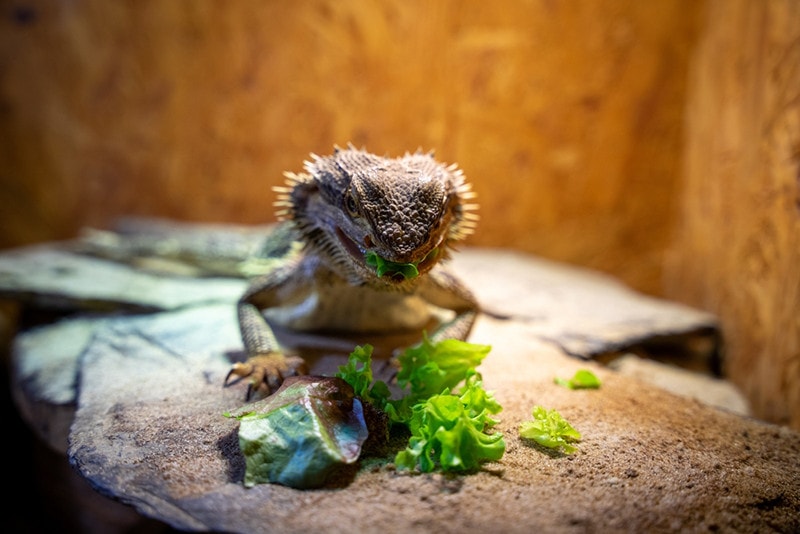
 Final Thoughts
Final Thoughts
While a small piece of cooked meat now and then isn’t going to harm your beardie, there are many healthier and more species-appropriate foods you should be feeding him instead. Focus on providing a good mixture of staple veggies and vegetable mixers to your pet’s daily salad. Switch up his protein sources occasionally to add variety to his diet to prevent boredom and meet his nutritional needs.
See also:
- Can Bearded Dragons Eat Leeks? Vet-Approved Pros, Cons & Tips
- Can Bearded Dragons Eat Radish? Vet-Approved Pros, Cons & FAQ
Featured Image Credit: APICE CREATIVE, Shutterstock


